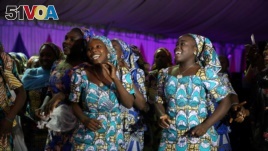25 September, 2017
More than 100 young women have returned to school for the first time in three years.
The young women were schoolgirls in the Nigerian town of Chibok when they kidnapped in 2014. Their kidnappers were supporters of the militant group Boko Haram. Some, but not all of the "Chibok girls" were later released or escaped.
Now, more than 100 of them are starting a new life after months of rest and recovery under the care of the Nigerian government.
The girls had expect to start taking classes at the American University of Nigeria in the city of Yola early next month. But the head of the Chibok parents' association, Yakubu Nkeki, said the start date was moved up because the school year had already begun.
"I went with them to the school until they were handed over to the school authority," Nkeki told VOA. "Since the school has already started, it was decided that it is best for them to go straight to school so they don't miss too many classes. They were already starting late."
To celebrate, the government threw the young women a send-off party earlier this month in the capital, Abuja.

Some of the 106 girls who were kidnapped by Boko Haram militants in the Nigerian town of Chibok, are seen dancing joyfully during the the send-forth dinner organised for them in Abuja, Nigeria, Sept. 13, 2017.
At the party, the minister for women's affairs and social development, Hajia Jummai Alhassan, said the girls will start remedial classes at the university. She said this would help prepare them for undergraduate classes in any subject of their choice. The federal government is paying for their schooling.
The American University of Nigeria already has 24 young women who escaped from Boko Haram fighters. They fled shortly after the militants kidnapped more than 250 students from a secondary school in Chibok in April 2014.
The kidnappings fueled a worldwide "Bring Back Our Girls" movement. The campaign had many supporters in the United States, including Michelle Obama, wife of former president Barack Obama.
A long road to recovery
The girls who entered the university this week spent 30 to 37 months in captivity before the militants released them in two groups after negotiations with the government.
American politician

Congress Woman Frederica Wilson
was a supporter of the "Bring Back Our Girls" movement. Wilson is a member of the U.S. House of Representatives. She met the young women in Abuja before they left the city, and told VOA the former captives seemed to be in good shape.
Wilson added that according to their caretakers, the Chibok girls had a long period of medical and psychological treatment.
"Can you imagine being held captive with terrorists, men who frighten you every single day for three years?" she asked. "When you are released, you are not normal, your psyche is not too good. They had to debrief them and help them."
Wilson said she was told that some girls are recovering from bullet wounds, machete wounds and snake bites.
"Because these girls had been together so long, to separate them would have traumatized them in my estimation. I think the decision to keep them together was the best thing they could have done," she said.
More than 100 girls from Chibok are still in Boko Haram captivity, three-and-a-half years after they were kidnapped.
At the send-off party, Women's Affairs Minister Alhassan said she is hopeful the rest of the girls will be freed.
"I assure you that by the grace of God, we will have our remaining girls released," she said.
I'm Phil Dierking.
Grace Alheri Abdur reported this story for VOANews. Phil Dierking adapted her report for VOA Learning English. George Grow was the editor.
What do you think is the best way for people to recover after captivity? We want to hear from you. Write to us in the Comments Section or on 51VOA.COM.
______________________________________________________________
Words in This Story
according to - prep. as stated, reported, or recorded by
captive - n. captured and kept in a prison, cage, etc.
machete - n. a large, heavy knife that is used for cutting plants and as a weapon
psyche - n. the soul, mind, or personality of a person or group
remedial - adj. involving students who need special help to improve in a particular subject
traumatize - v. to cause (someone) to become very upset in a way that often leads to serious emotional problems
undergraduate - n. a student at a college or university who has not yet earned a degree